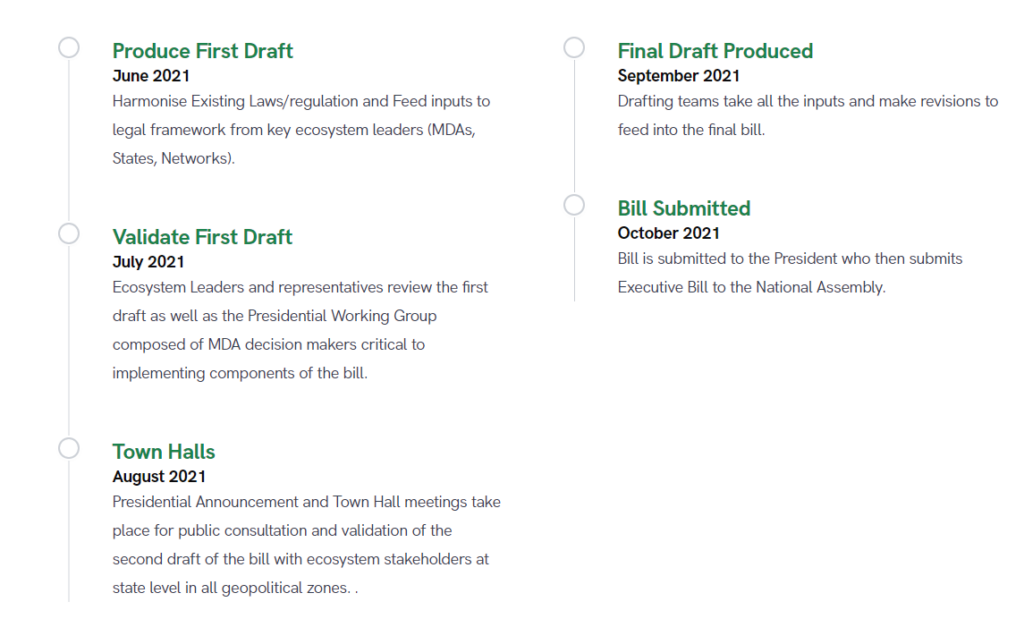The Nigerian Senate has passed the Nigeria Startup Bill (NSB) to create and develop an enabling environment for technology-enabled startups in the country.
The Bill which was approved by the Federal Executive Council (FEC) in December 2021 and sent to the National Assembly for consideration was passed yesterday (July 20, 2022) by the Senate after a report by the Senate Committee on ICT and cyber security led by Oseni Yakubu.
Nigeria Start-up Bill, 2022 (SB. 966) was read the Third Time and PASSED!
— The Nigerian Senate (@NGRSenate) July 20, 2022
The Bill will now be sent to the Presidency for final assent, after passing three readings at the House of Representatives (HoR) where it will pass through 3 readings.
The Nigeria Startup Bill is a collaborative effort between the Presidency, the Federal Ministry of Communications and Digital Economy, the Nigerian Export and Promotion Council and other government bodies. The initiative for the NSB was launched in May 2021, by the Presidency, in collaboration with 30 tech leaders, including Ventures Platform founder Kola Aina and Future Africa founder Iyin Aboyeji, officials of the National Information Technology Development Agency (NITDA), and the Minister of Digital Economy Isa Pantami.
“Regulatory uncertainty disincentivizes investment, which is critical for the growth of our innovation space and the country broadly. So if this Bill is able to reduce that uncertainty and create the kind of regulatory clarity that attracts capital, it would be a major win for the ecosystem,” Tomiwa Aladekomo, a member of the Presidential Advisory Strategic Group Members on the NBS told Benjamindada.com last year.

With the Bill, a Council for Digital Innovation and Entrepreneurship will be created, the council will be responsible for the formulation and provision of general policy guidelines for the realization of the objectives of the Bill and also give overall direction for the harmonisation of laws and regulations that affect a startup.
The proposed Council will be led by the President of Nigeria, the Vice President, Ministers of Digital Economy; Finance; Trade and Investment; Science and Technology, the Governor of the Central Bank of Nigeria, three representatives of the Startup Consultative Forum, two representatives of the Nigeria Computer Society and the Director General of National Information Technology Development Agency–NITDA.
What is a Nigerian startup, according to NSB?
According to the Bill, a (Nigerian) startup is an innovation or technology-driven company that meets the following criteria:
- is registered as a company under the Companies and Allied Matters Act and has been in existence for a period of not more than ten (10) years from the date of its incorporation or registration;
- has as its objective, the innovation, development, production or improvement and commercialisation of an innovative product or process;
- has its headquarters in Nigeria;
- has at least 51% of its shares held by one or more Nigerians, provided that where the level of foreign participation exceeds this prescribed threshold, the entity may still be entitled to enjoy the benefits provided under the Act if the ultimate beneficial owners of its foreign shareholders are Nigerian citizens;
- has as its innovative product or process, new technology or a product/process which is technology-enabled;
- has at least 15% of its expenses attributed to research and development activities; and has less than 100 direct employees, excluding casual workers, consultants and personnel engaged through Business Process Outsourcing.

Kaduna and Lagos to domesticate the Nigerian Startup Bill
Out of Nigeria’s 36 states and the FCT, only Kaduna and Lagos states have indicated interest to domesticate the Startup Bill (at the time of this report).
In March 2022, the Kaduna state government through the Kaduna Investment Promotion Agency said that “the sub-national [startup] bill will create an enabling regulatory environment for startups, promote the development and expansion of Businesses, support Innovation, accelerate technology and allow a private-sector driven, vibrantly entrepreneurial and the digital ecosystem to thrive.”
Sanusi Ismaila, the Founder of CoLab Kaduna told Benjamindada.com that “the Bill has interesting things that will aid the Kaduna Technology City” — with suggestions including a “dig-once” fibre policy, incentivised STEM education to nurture talent early, and government incentives for startups domiciled within the city.
During the Co-Create 2022 Tech Expo in Lagos, Tunbosun Alake, the Special Adviser on Innovation & Technology to Lagos state’s Governor, Babajide Sanwoolu said that Lagos state is also trying to domesticate the Bill.








